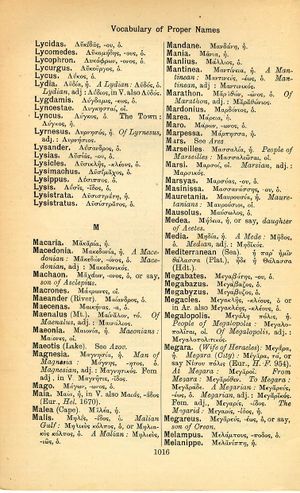Lycophron: Difference between revisions
From LSJ
Εἷς ἐστι δοῦλος οἰκίας ὁ δεσπότης → Unus familiae servus ipse adeo est herus → Nur einen Sklaven gibt's allein im Haus, den Herrn
(D_5) |
(Gf-D_5) |
||
| Line 1: | Line 1: | ||
{{WoodhouseENELnames | {{WoodhouseENELnames | ||
|Text=[[File:woodhouse_1016.jpg|thumb|link= | |Text=[[File:woodhouse_1016.jpg|thumb | ||
|link={{filepath:woodhouse_1016.jpg}}]]Λυκόφρων, -ονος, ὁ. | |||
}} | }} | ||
{{Lewis | {{Lewis | ||
Revision as of 07:41, 14 August 2017
English > Greek (Woodhouse)
Λυκόφρων, -ονος, ὁ.
Latin > English (Lewis & Short)
Lycŏphron: ŏnis, m., = Λυκόφρων,
I Lycophron of Chalcis, in Eubœa, the author of Cassandra, an Alexandrine grammarian and tragedian of the time of Ptolemy Philadelphus: utque cothurnatum periisse Lycophrona narrant, Ov. Ib. 531: latebrae Lycophronis atri, so called from his obscure style, Stat. S. 5, 3, 157.
Latin > French (Gaffiot 2016)
Lўcŏphrōn, ŏnis, m. (Λυκόφρων), poète tragique de Chalcis, célèbre par l’obscurité de son style : Stat. S. 5, 3, 157 ; Ov. Ib. 531.

